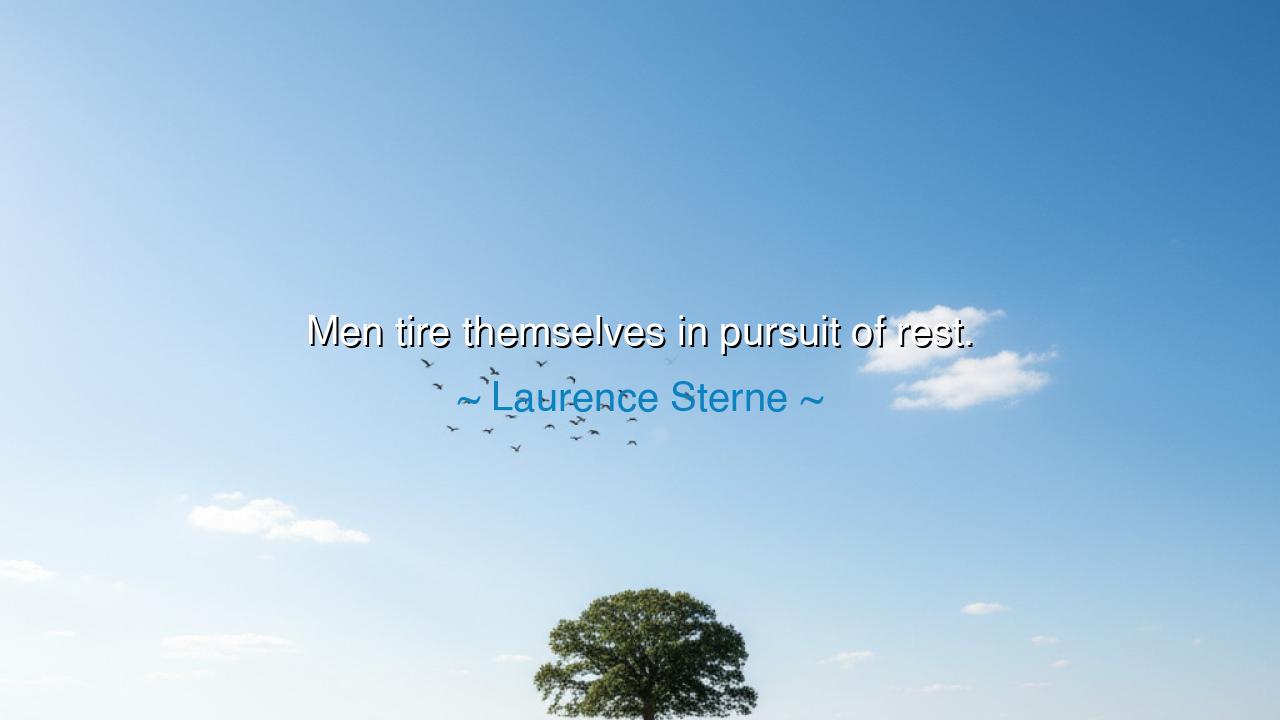
Men tire themselves in pursuit of rest.






Hear, O children of dust and spirit, the words of Laurence Sterne, who peered into the folly of men and clothed it in truth: “Men tire themselves in pursuit of rest.” These words, though simple, carry the weight of an eternal paradox. For what greater irony exists than that mankind, ever chasing comfort and peace, so often destroys both by the frenzy of pursuit? What should be ease becomes toil, and what should be joy becomes exhaustion.
The meaning of this teaching lies in the restless heart of man. We labor endlessly, not only for survival, but for a dream of leisure—of that day when all toil will cease and we may finally rest. Yet, in our frantic striving, we ruin the very peace we long for. The merchant piles up wealth to one day enjoy freedom, yet he spends his life enslaved to commerce. The ruler wages war to secure lasting stability, yet in doing so condemns his people to unending strife. So too the ordinary man, who hurries through his days, exhausting himself in the hope that tomorrow he will have time to rest—yet tomorrow never comes.
History is filled with such ironies. Consider Alexander the Great, who conquered nations ceaselessly, declaring with each victory that he sought peace for his empire. But in his restless march across the world, he found neither peace nor rest. When he reached the limits of the known earth, he wept, not because he had found contentment, but because there were no more worlds to conquer. His body gave out before his soul could find repose. Thus, even kings prove Sterne’s words true: rest cannot be found by endless pursuit—it must be cultivated within.
Or recall the tale of Diogenes the Cynic, who rejected the trappings of wealth and power. While others exhausted themselves in pursuit of comfort, he lived in simplicity, resting under the sun, content with little. When Alexander himself asked Diogenes what he might grant him, the philosopher merely replied: “Stand out of my light.” In that moment, the conqueror envied the beggar, for Diogenes already possessed the rest and freedom that Alexander’s armies could not secure.
The wisdom of Sterne’s words is not to condemn work itself, but to remind us that rest is not a prize to be earned through exhaustion, but a state of being to be chosen. To chase it blindly is to turn it into another form of slavery. To live in balance, to pause, to breathe, to dwell in the present—these are the true gateways to rest. The man who delays rest until tomorrow may find that tomorrow never arrives.
The lesson for us, therefore, is to cease seeking peace in the distant horizon and to learn how to plant it where we stand. Rest is not a treasure hidden at the end of years of toil; it is a discipline of the heart, an ability to stop running, to savor the moment, to live without the fever of constant striving. The wise know how to work with vigor and yet rest within themselves, like a tree that grows with strength yet stands in stillness.
As for practical action, let each day contain a portion of rest. Do not wait for retirement, or wealth, or perfect circumstances. Take walks beneath the open sky, free from the noise of labor. Put aside the endless chase for “more,” and ask instead, “What is enough?” Learn the art of simplicity, for in simplicity lies contentment. And above all, remember: if you are weary in the pursuit of peace, then you are walking in the wrong direction.
Thus, Sterne’s words, cast like a mirror before us, shine with both irony and guidance. Men tire themselves in pursuit of rest, but the wise will turn from pursuit to presence, from exhaustion to balance. And in doing so, they will discover that true rest was never a distant prize—it was always within their grasp, waiting for them to be still.






AAdministratorAdministrator
Welcome, honored guests. Please leave a comment, we will respond soon